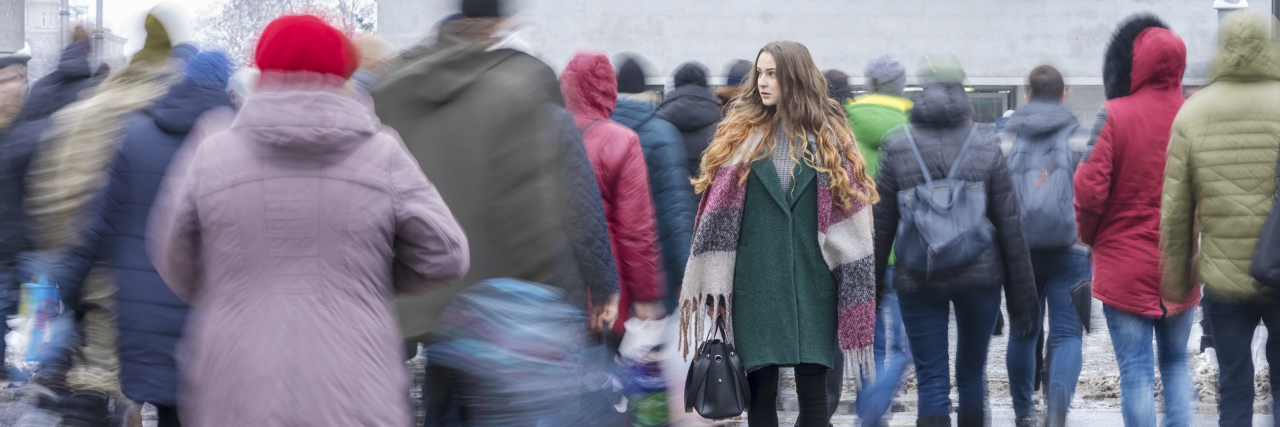The Parts of Epilepsy We Often Don't Talk About
Editor's Note
Please see a doctor before starting or stopping a medication.
Growing up, my biggest secret was that I had epilepsy. I have had it since I was 5. Neurologists kept saying, “She’ll grow out of it.” I’ve tried medication after medication, trying to control the seizures and limit the number of side effects. I’ve tried weaning off medication, only for a seizure to return within one or two days. Life becomes more bearable when my seizures are controlled, but I never feel carefree. Epilepsy is much more than having seizures.
With my epilepsy comes fear. I am constantly cautious and afraid. I am afraid of having a seizure during school, at work or in public. Although I’ve been seizure-free for over a year, I am afraid of driving down the road and feeling that tingling in my stomach and not being able to pull the car over quickly or safely enough. I am afraid of injuring my brain and body beyond repair. I am afraid of who will see me. I am afraid of waking up from a seizure and being alone. I am afraid of forgetting my medication.
Other relevant stories:
• Things You Can’t Do with Epilepsy
• Is Epilepsy an Autoimmune Disease
• Can Epilepsy Kill You
With my epilepsy comes depression. For me, epilepsy has always brought along depression for company. With each anti-seizure medication, the depression waxes and wanes, but it always lingers like a permanent resident in my brain. When I am honest about my suicidal thoughts, doctors prescribe an antidepressant. We both hope the depression will fade, but I am usually met with a new set of side effects. Together, both conditions appear invincible, but I always fight back. Depression tells me to die instead of taking the pills from the container. Depression tells me the darkness is here to stay. Depression steals my energy and my smiles. When I am always outnumbered, and the fight is unfair, I wonder how much of who I have become is due to the medication and how much is truly me.
Too often, with epilepsy comes shame. All through grade school, I heard kids at school make fun of seizures and even pretend to have seizures. I listened and watched. As one of the quietest students in class, my lips felt zippered shut, but my face turned red. They did not know what it feels like to lose control of your body. They didn’t know what it was like to wake up confused and disoriented, not knowing how long the seizure lasted or what was happening before it. I was not brave enough to speak up.
My closest friends didn’t know I had epilepsy. I snuck away at sleepovers to take my medication at 8:00 p.m. I made excuses as to why I couldn’t drive, why I wouldn’t drink alcohol, why I occasionally arrived to school late, why I visited a hospital that was over an hour away rather than the local doctor’s office, or why there was a bruise on my forehead. When I started telling people outside of my family, they would reply with phrases such as “I didn’t know that you were an epileptic,” “I need to be careful around you,” or “At least it’s not something terminal.” They may not have known their words were insensitive or hurtful, but I have never been met with comfort or acceptance after telling my story. Only shame.
Epilepsy can be somewhat of an invisible illness. Sometimes I can hide it. Other times, I can’t. Epilepsy is much more than having seizures. For some people, myself included, it’s a lifelong challenge.
Having epilepsy can mean battling depression, anxiety, insomnia, muscle weakness, lethargy, weight gain, and a host of other negative side effects from seizures and medications. It can mean staying home from work or school because of an aura. It can mean keeping secrets from best friends. It can mean refusing to give up regardless of what others think and say, how many medications you’ve tried, and the side effects that never subside. I have often wondered who I would be without epilepsy. While I fight the shame and stigma within myself, I have learned and accepted that epilepsy is a part of who I am.
But only one part.
Getty image by Grash Alex.

